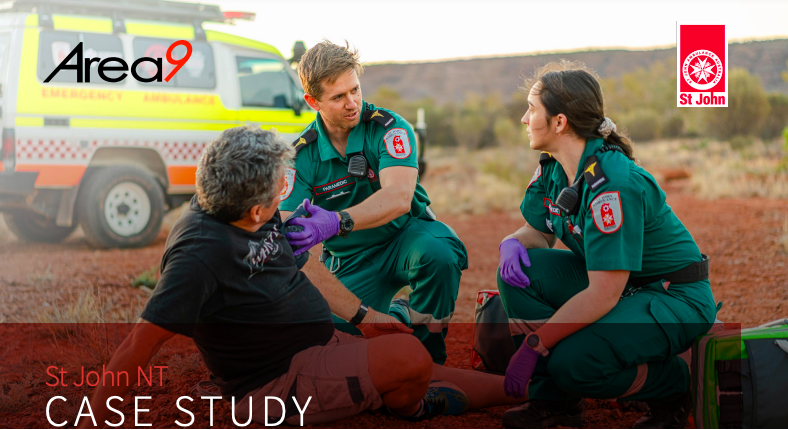Every organisation relies on data and reporting to varying extents, yet it’s not always where they would prefer to have their focus. For frontline healthcare providers and community organisations, they know their efforts are better utilised in serving their communities.
An excellent example of this is St John Ambulance Australia NT (St John NT), who is the Territory’s leading provider in emergency medical response and preparedness. They have a mission to save lives and build community resilience to improve the safety and healthcare for all Territorians.
They do this by providing a range of services from ambulance services under contract to the Northern Territory Government, coordination of emergency medical responses, event health services and first aid assistance at community and major events through to nationally accredited first aid training, community education and first aid products and equipment
With performance obligations to meet and report on, St John NT was finding a significant amount of their administration team’s time was being spent on manual reporting activities. Under their obligations, for example, they needed to provide timely and detailed reports on the amount of time it would take their Ambulance crews to get to a cardiac arrest patient or a non-emergency patient.
“It all comes back to improving the management of the operation. And that might be managing fatigue better, or getting our crews timely meal breaks and seeing where the gaps are in in these areas. So instead of staff spending hours on a report, they can better utilise their time to improve areas of service delivery.”
Ali Malik – Chief Financial Officer – St John Ambulance NT
With the additional pressures that COVID-19 presented in 2020, St John NT needed their data and reporting focus to be on finding avenues for improving key drivers in their operations, such as how they train and manage the demand they face, and allocating resources to cope.
St John NT had been reporting from their operational systems using various databases and an employee dedicated to maintaining these databases and creating reports. Realising they needed a more efficient solution, they engaged their long time IT service provider Area9 to review the databases and reports.
Area9 have been working with St John NT since 2007 after tendering for support services initially, and have since been through two more tender processes to be designated as a preferred supplier. Area9 has also been supporting St John NT’s volunteers for that same period, and are invested in St John NT as a partnership.
It was found that the existing data maintenance was an incredibly manual and labour intensive process that required constant review. Additionally, the reports being generated were also quite labour intensive and required quite a lot of specific domain knowledge from a limited number of staff who are frontline employees that should not be tied up doing reporting if possible.
An answer in automation
Area9 proposed the automation of the data importing and maintenance, and agreed with St John’s decision to build a data warehouse to allow better reporting of the data – reducing the reliance on frontline employees to build reports.
After a detailed planning and consultation phase, Area9 proposed two solutions:
- Automating all data import from external systems to central databases.
- Building a data warehouse and using the existing databases as a data source to sync information required into the warehouse on a regular basis.
Area9 managed the entire project, with subject matter experts provided by St John NT.
The data warehouse project will continue until all the reports are written, and St John is capable of self-serving reports using a reporting tool such as Tableau.
For the reporting, what was previously one FTE staff member’s entire workload is now 50% completed using an automated process. The data warehouse will allow St John NT to aggregate more than their event based systems, while also drawing in information from finance and other areas to allow senior management to self-serve reports as required
“What this allows us to do is reallocate staff to an area where business improvement is required. That could be ensuring the quality of service we’re delivering is at a high standard, managing fatigue better, or getting our crews timely meal breaks and seeing where the gaps are in in these areas.”
Ali Malik – Chief Financial Officer – St John Ambulance NT
Many of the existing reports would take many hours to compile, however the reports that have been written in the data warehouse to replace some of these take seconds to run and are automatic. This saves substantial time from emergency services staff.
Discovering new possibilities for automation
After going ahead with Area9’s proposal, the project has since been delivered on time and under budget. The automated reporting product St John NT received has encouraged them to explore new possibilities for other manual processes they can automate.
St John NT say they were most impressed by Area9’s professionalism, and the planning and advice brought to the process. Through a phased approach to identify different milestones to deliver, St John NT were able to get the most out of that discovery phase, which has led to a successful delivery phase and implementation.
“Area9 have got a very experienced workforce, and they’re a great example of what I would call a local organisation. They have industry knowledge and are aware of the latest technology, including how it could be utilised within a unique organisation such as ours to improve what we do every day.”
Ali Malik – Chief Financial Officer – St John Ambulance NT
